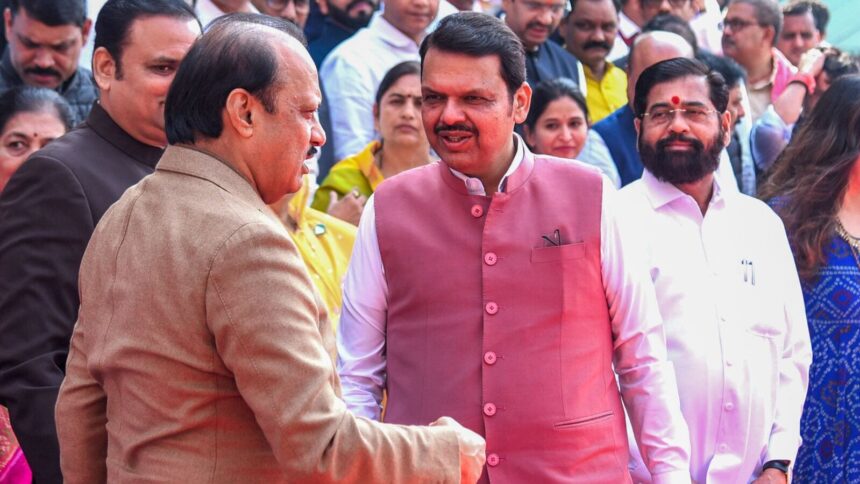Maharashtra Government’s New Cabinet: A Detailed Breakdown
On December 15, 2023, Maharashtra’s political landscape was reshaped as Chief Minister Devendra Fadnavis announced the portfolio allocations for his newly expanded cabinet. This comes after a decisive victory for the ruling alliance, leading to a significant reshuffling aimed at addressing the urgent needs of governance while aligning with the priorities of various stakeholders.
Key Appointments and Portfolios
The allocation of portfolios has sparked interest and discussions among political analysts and the general public alike. Here’s a detailed list of the cabinet members and their respective portfolios:
- Devendra Fadnavis: Home Ministry
- Ajit Pawar: Finance
- Eknath Shinde: Urban Development
- Dhananjay Munde: Food and Civil Supplies
- Ashok Uike: Tribal Development
- Ashish Shelar: IT and Culture Department
- Chandrashekhar Bawankule: Revenue
- Radhakrishna Vikhe Patil: Water Resources
- Hasan Mushrif: Medical Education
- Chandrakant Patil: Higher and Technical Education
- Ganesh Naik: Forests
- Dada Bhuse: School Education
- Uday Samant: Industries
- Pankaja Munde: Environment
- Manikrao Kokate: Agriculture
- Aditi Tatkare: Women and Child Development
- Jaykumar Gore: Rural Development
- Sanjay Shirsat: Social Justice
The diversity in portfolio distribution reflects an intention to cater to various sectors, hinting at a strategic alliance at a time when administrative efficiency is a pressing concern.
Machinations Behind the Allocations
Chief Minister Fadnavis and Deputy Chief Minister Ajit Pawar have made it clear that collaboration is essential among Mahayuti leaders, comprising the Bharatiya Janata Party (BJP), Shiv Sena, and Nationalist Congress Party (NCP). Prior to the cabinet expansion, the leaders met to ensure a unified approach and minimize discord among the parties.
In his statements, Deputy CM Ajit Pawar emphasized a vital aspect of leadership transitions within the cabinet: the notion of ‘opportunity rotation.’ Pawar noted that certain ministers might serve in their roles for a duration of 2.5 years before passing the baton to emerging leaders within their respective parties. This approach is designed to encourage new faces and ideas in the governance process, thereby enhancing accountability and fresh perspectives on existing issues.
Implications for Governance
The portfolio allocations resonate deeply with the voters’ expectations and the pressing issues facing Maharashtra today. The Home Ministry under Fadnavis is crucial, especially in terms of maintaining law and order in a state known for its vibrant yet complex socio-political tapestry. Ajit Pawar’s role in Finance will be pivotal in managing the state’s economic challenges, particularly as Maharashtra navigates the impact of previous economic policies and the current post-pandemic recovery phase.
The focus on important sectors such as education, health, and tribal development through dedicated ministers illustrates a comprehensive strategy to cater to the state’s diverse demographic and socio-economic needs. Furthermore, the emphasis on women and child development through Aditi Tatkare’s appointment signals a commitment to empowering these crucial segments of society.
Conclusion
As Maharashtra embarks on another chapter of governance with this new cabinet, the spotlight will be on the alliance’s performance and cohesion. Analysts will be closely watching how effectively these leaders can collaborate to keep the promises made during their campaign. The stability of this government and its success in implementing its policies will not only determine its longevity but will also shape the political landscape of Maharashtra in the coming years.
In summary, the new cabinet represents a blend of seasoned politicians and fresh faces, poised to tackle the various challenges that lie ahead while aiming to foster growth and development across the state.










